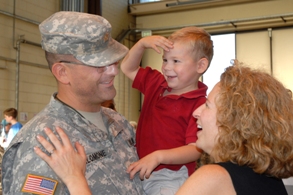
U.S. Army photo by Dennis Johnson
For many service members homecomings, although a very joyful time, can also be a stressful and challenging period.
It’s common for service members to experience a certain level of stress, anxiety or other psychological health concerns as they reintegrate back home and into their communities, especially among those deployed to hostile environments.
If you’re transitioning from deployment, know that you’re not alone and there is help and support available for post-deployment concerns, such as afterdeployment.dcoe.mil.
What is afterdeployment.dcoe.mil?
afterdeployment.dcoe.mil is an interactive behavioral health resource supporting warriors, veterans, families and providers. The website provides information on several topics to include the challenges service members routinely face in the months following deployment. No matter where you are, if you have an Internet connection you can access a variety of online behavioral tools to include self-assessments, self-paced workshops, videos featuring service members and families, and resources throughout the site.